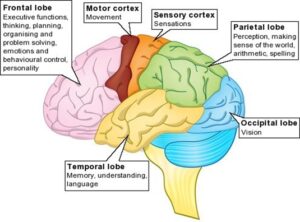Related Products
For Professionals
- Amplification
- Assessment of Student Skills, Challenges, Needs
- Early Childhood: Infants, Toddlers, Preschool
- Hearing Loss – Identification, Impact and Next Steps
- IDEA Law Summary Information
- Language and Speech Development Issues
- Legal Issues in Serving Children with Hearing Loss
- Listening (Auditory Skills) Development
- Planning to Meet Student Needs
- Self-Advocacy Skills for Students with Hearing Loss
- Self-Concept: How the Child with Hearing Loss Sees Himself
- Social Skills
- Speech Perception & Learning
Related Teacher Tools Takeout Items
Implications of Screen Time on Children with Hearing Loss

In today’s digital age, screen time has become an integral part of children’s lives, including those who are deaf and hard of hearing. While screens offer numerous educational and entertainment opportunities, excessive screen time can have significant implications for the development and well-being of children particularly those with hearing loss.
Language Acquisition:
One of the primary concerns regarding screen time for children who are deaf and hard of hearing is its potential impact on language acquisition. Language development is crucial for all children, but it is especially important for children with hearing loss, as they rely heavily on visual communication methods such as sign language, speechreading, facial cues, and information gathered from their environment. Excessive screen time can limit opportunities for face-to-face communication and interaction, which are essential for language learning. Research suggests that children who are deaf and hard of hearing, who spend excessive time on screens, may experience language acquisition deficits as well as deficits in cognitive development when compared to their peers who have limited screen time.

Social Development:
Screen time can also have implications for the social development of children with hearing loss. Social interaction plays a vital role in the development of social skills, empathy, and emotional intelligence. Excessive screen time can reduce opportunities for children who are deaf and hard of hearing to engage in face-to-face interactions with their peers and family members, potentially leading to social isolation and difficulties in forming meaningful relationships. Additionally, prolonged screen use can contribute to a sedentary lifestyle, which may further exacerbate social and overall health issues.
Attention:
Attention is a fundamental cognitive skill that plays a crucial role in learning and academic achievement. Excessive screen time can negatively impact attention in children with hearing loss, as it can lead to decreased focus and increased distractibility. Research suggests that children with hearing loss who spend more time on screens may have shorter attention spans and difficulty maintaining focus in classroom settings. This can impede their ability to absorb information and participate actively in learning activities, potentially affecting their academic performance.
Executive Function:

Executive function refers to a set of cognitive skills that help individuals plan, organize, control emotions, impulsivity, working memory, focus, task initiation/completion, stress tolerance, ability to adapt in environmental situations, time management and execution of tasks. Executive functioning develops throughout childhood into early adult years and plays an instrumental role in academic success, as it enables students to manage their time effectively, set goals, and regulate their behavior. Excessive screen time can impair executive function in children, as it can disrupt the development of these skills. Studies have shown that children who are deaf and hard of hearing who spend more time on screens may have poorer executive function skills compared to their peers who have limited screen time. This can manifest as difficulties in planning, organizing, and completing tasks, which can hinder their academic progress.
Academic Performance:
The impact of screen time on the academic performance of children is a growing concern, especially since the implications of COVID are still not fully known. Excessive screen use can interfere with learning by reducing the time spent on educational activities and homework. It can also disrupt the development of critical thinking and problem-solving skills, which are essential for academic success. Studies have found that children who are deaf and hard of hearing who spend more time on screens may have lower academic achievement compared to their peers who have a reduced amount of screen time. This highlights the importance of promoting healthy screen habits and providing alternative activities that support cognitive development and academic success.
Cognitive Development:
The pervasive use of screens in modern society has raised concerns about its impact on children’s cognitive development. For children with hearing loss, who already face unique challenges in communication and learning, the effects of screen time on cognitive development are particularly significant. Neural pathways are constantly developing in young children. The auditory, visual, and motor cortexes are an integral part of cognitive development in young children. These neural pathways will establish cognitive strengths and weakness into adulthood, so providing input that will strengthen the pathways and increase the capacity for learning and understanding is essential. Overuse of screentime may inhibit some of these pathways from fully developing because they are not able to access certain patterns of information from various sources.
|
In addition, too much screen time may lead to:
|
According to the American Academy of Child & Adolescent Psychiatry, there are ways to manage your child’s screen time and devise a plan that is beneficial for parents and children. Recommendations for screen usage:
- Until 18 months of age limit screen use to video chatting along with an adult (for example, with a parent who is out of town).
- Between 18- and 24-months screen time should be limited to watching educational programming with a caregiver.
- For children 2-5, limit non-educational screen time to about 1 hour per weekday and 3 hours on the weekend days.
- For ages 6 and older, encourage healthy habits and limit activities that include screens.
- Turn off all screens during family meals and outings.
- Learn about and use parental controls.
- Avoid using screens as pacifiers, babysitters, or to stop tantrums.
- Turn off screens and remove them from bedrooms 30-60 minutes before bedtime.
While screens can offer valuable educational and entertainment opportunities, it is essential to balance screen time with other activities that promote language development, social interaction, attention, executive functioning skills, academics, cognitive development and physical activity. By providing alternative activities to support the development in these areas, we can help all children reach their full potential and thrive in a digital world.
Click Here to download this article
